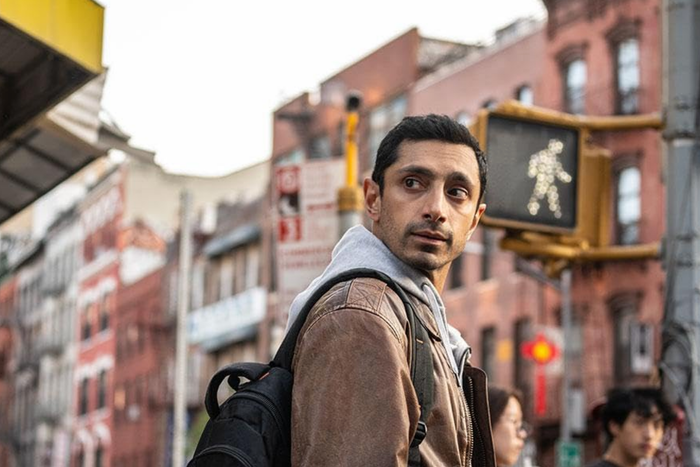
The relay referred to in the title of David Mackenzie’s absurdly gripping new thriller, which premiered yesterday at the Toronto International Film Festival, is the Tri-State telecommunications relay service, a platform that enables those who are deaf or hard-of-hearing to make phone calls via a texting device and an operator. They type their messages on one end, and an operator reads it to the person on the other end. In Relay, however, the service is used to maintain anonymity by a man (Riz Ahmed) whose name might be Tom, or Ash, or something else, a cool, methodical professional who helps protect whistleblowers that have had a change of heart. These are people who have made off with their former companies’ secrets but now want their lives back. To do so, they must contact their company, return what they’ve taken, and get some sort of guarantee that they will not be hunted down by any paid goons. Ash and the people he works for provide that guarantee in exchange for generous payments from both sides. He’s both foot-soldier and guardian angel, quiet and ruthless.
Frankly, this is a great idea for a corporate espionage thriller. Most viewers will be unfamiliar with a relay service, so discovering the way such services operate becomes part of the film’s many minor, fun reveals. It also provides a novel way to keep the protagonists apart while allowing them to communicate. In Relay, Ash gets hired by Sarah Grant (Lily James), a scientist working for an agrobusiness firm who’s made off with a huge report detailing the adverse health effects of genetically modified crops. After being subjected to non-stop harassment, she wants to return the report and walk away without any further repercussions. As Ash watches her, he spots that she’s being monitored by a van full of heavies led by Sam Worthington.
The conceit of the telecommunications relay gives the movie a tense mood unlike any other. Every time Ash calls Sarah, his words are spoken by someone completely new, a total stranger with their own intonation. We see their faces as they read his messages: Are they concerned? Are they indifferent? Is this kind of calm, vocally uninflected professionalism simply part of the job? That we don’t really hear Ash’s voice for much of the first half enhances his enigma, both in Sarah’s eyes and in ours. (She never sees him, but we do.) There’s even a scene where we see him go in the back room of a market to purchase a fake ID … and he and the other guy wind up speaking in sign language! Do they do it because one is deaf, or because they fear they’re being eavesdropped on? The film works its paranoia on us through both atmosphere and narrative incident. That’s important because it means we never really know who’s watching us and where, and in today’s world it’s safe to assume that we’re being watched, always.
Mackenzie’s career has seen him go from unabashed stylization to more restrained work — so much so that it can sometimes be hard to pin him down as an artist. At his best — in pictures like Hell or High Water and Perfect Sense — he tamps down the showiness without sacrificing his directorial voice. In Relay, when we see Ash speak to Sarah, he’s often in close-up, cocooned in nocturnal blurs of urban neon; his world is closed off. She, on the other hand, is usually filmed at a slight distance, with her surroundings in sharp focus, and screens everywhere; she’s exposed. The contrast in framing seeps into our brains and reinforces the characters’ perilous states. But it also creates an emotional bond. Sarah sees comfort and security in Ash; he sees connection in her. His isolation might start as a great advantage, but he gradually seems lonelier, more pathetic, a man who has sacrificed his self for his job. That Mackenzie and screenwriter Justin Piasecki directly quote several Michael Mann films should come as no surprise. Relay moves from suspense to something else. It’s not quite a love story, but it is a romance — a bluesy, boozy, defeated one, with clasped hands, muted farewells, final glances at moving trains. The stuff of true cinematic longing.
At least, for a while. Mackenzie and his cast dance around and through this drama so elegantly and delicately that the twisty, generic ending feels like even more of a letdown than it might have in a more ordinary picture. The details are not worth getting into, but Relay is the rare movie where I might recommend leaving ten minutes before the end. Or hell, lop off the finale, make it a pilot, and turn it into a series; I’d even accept that. The rest of the film is so strong that any ending it inspires one to imagine would probably be better than what we ultimately get. But still, up until then — wow.
More From Toronto
- Thank the Cinema Gods, Mike Leigh Is Back
- The Craziest Musical of the Year Is Finally Here
- Is a Movie About Electing a Pope Allowed to Be This Entertaining?


